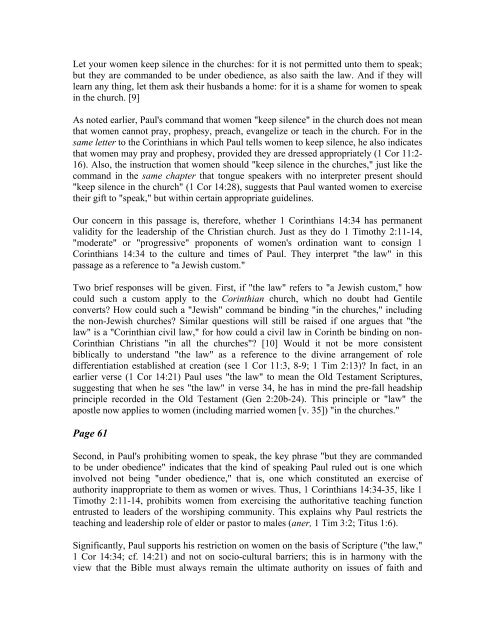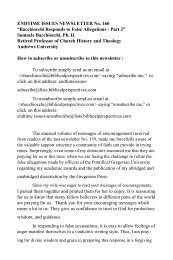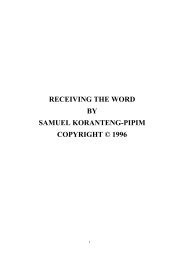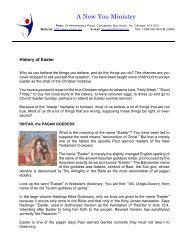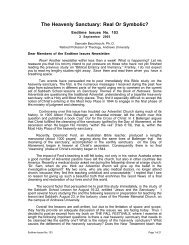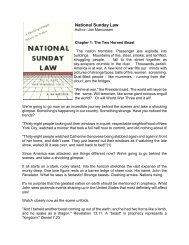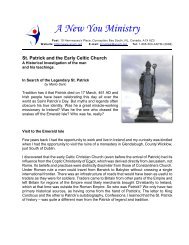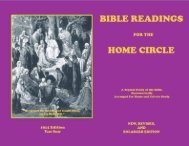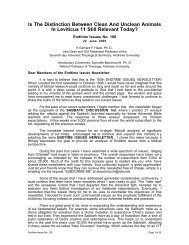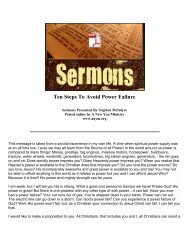Searching the Scriptures - Samuel Pipim
Searching the Scriptures - Samuel Pipim
Searching the Scriptures - Samuel Pipim
- No tags were found...
You also want an ePaper? Increase the reach of your titles
YUMPU automatically turns print PDFs into web optimized ePapers that Google loves.
Let your women keep silence in <strong>the</strong> churches: for it is not permitted unto <strong>the</strong>m to speak;but <strong>the</strong>y are commanded to be under obedience, as also saith <strong>the</strong> law. And if <strong>the</strong>y willlearn any thing, let <strong>the</strong>m ask <strong>the</strong>ir husbands a home: for it is a shame for women to speakin <strong>the</strong> church. [9]As noted earlier, Paul's command that women "keep silence" in <strong>the</strong> church does not meanthat women cannot pray, prophesy, preach, evangelize or teach in <strong>the</strong> church. For in <strong>the</strong>same letter to <strong>the</strong> Corinthians in which Paul tells women to keep silence, he also indicatesthat women may pray and prophesy, provided <strong>the</strong>y are dressed appropriately (1 Cor 11:2-16). Also, <strong>the</strong> instruction that women should "keep silence in <strong>the</strong> churches," just like <strong>the</strong>command in <strong>the</strong> same chapter that tongue speakers with no interpreter present should"keep silence in <strong>the</strong> church" (1 Cor 14:28), suggests that Paul wanted women to exercise<strong>the</strong>ir gift to "speak," but within certain appropriate guidelines.Our concern in this passage is, <strong>the</strong>refore, whe<strong>the</strong>r 1 Corinthians 14:34 has permanentvalidity for <strong>the</strong> leadership of <strong>the</strong> Christian church. Just as <strong>the</strong>y do 1 Timothy 2:11-14,"moderate" or "progressive" proponents of women's ordination want to consign 1Corinthians 14:34 to <strong>the</strong> culture and times of Paul. They interpret "<strong>the</strong> law" in thispassage as a reference to "a Jewish custom."Two brief responses will be given. First, if "<strong>the</strong> law" refers to "a Jewish custom," howcould such a custom apply to <strong>the</strong> Corinthian church, which no doubt had Gentileconverts? How could such a "Jewish" command be binding "in <strong>the</strong> churches," including<strong>the</strong> non-Jewish churches? Similar questions will still be raised if one argues that "<strong>the</strong>law" is a "Corinthian civil law," for how could a civil law in Corinth be binding on non-Corinthian Christians "in all <strong>the</strong> churches"? [10] Would it not be more consistentbiblically to understand "<strong>the</strong> law" as a reference to <strong>the</strong> divine arrangement of roledifferentiation established at creation (see 1 Cor 11:3, 8-9; 1 Tim 2:13)? In fact, in anearlier verse (1 Cor 14:21) Paul uses "<strong>the</strong> law" to mean <strong>the</strong> Old Testament <strong>Scriptures</strong>,suggesting that when he ses "<strong>the</strong> law" in verse 34, he has in mind <strong>the</strong> pre-fall headshipprinciple recorded in <strong>the</strong> Old Testament (Gen 2:20b-24). This principle or "law" <strong>the</strong>apostle now applies to women (including married women [v. 35]) "in <strong>the</strong> churches."Page 61Second, in Paul's prohibiting women to speak, <strong>the</strong> key phrase "but <strong>the</strong>y are commandedto be under obedience" indicates that <strong>the</strong> kind of speaking Paul ruled out is one whichinvolved not being "under obedience," that is, one which constituted an exercise ofauthority inappropriate to <strong>the</strong>m as women or wives. Thus, 1 Corinthians 14:34-35, like 1Timothy 2:11-14, prohibits women from exercising <strong>the</strong> authoritative teaching functionentrusted to leaders of <strong>the</strong> worshiping community. This explains why Paul restricts <strong>the</strong>teaching and leadership role of elder or pastor to males (aner, 1 Tim 3:2; Titus 1:6).Significantly, Paul supports his restriction on women on <strong>the</strong> basis of Scripture ("<strong>the</strong> law,"1 Cor 14:34; cf. 14:21) and not on socio-cultural barriers; this is in harmony with <strong>the</strong>view that <strong>the</strong> Bible must always remain <strong>the</strong> ultimate authority on issues of faith and


